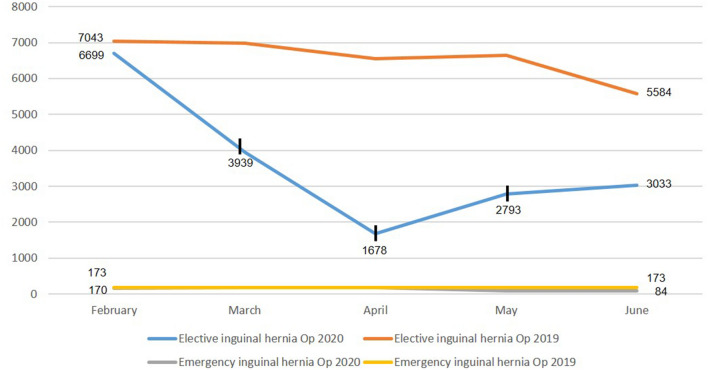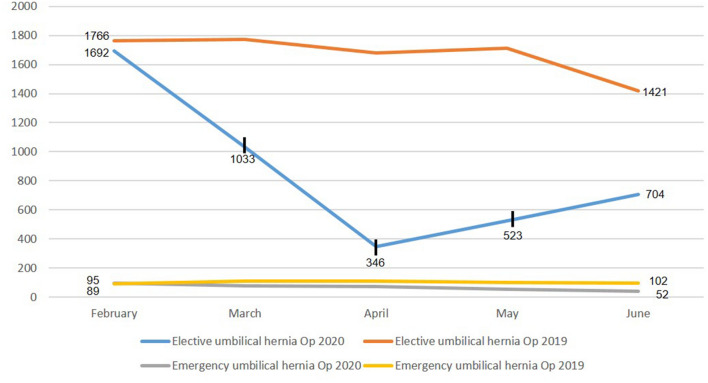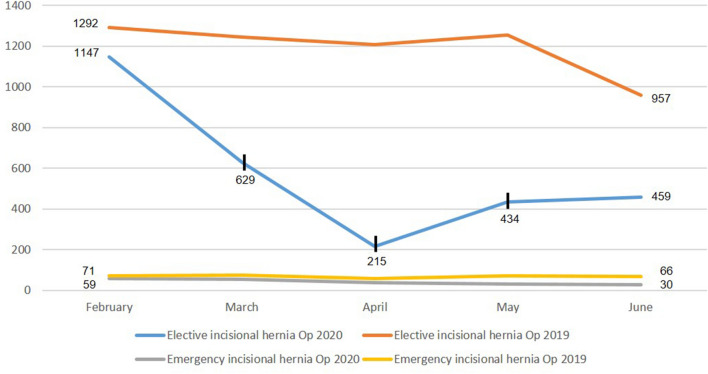Dear Editor,
The novel disease COVID-19 caused by the severe acute respiratory syndrome corona virus 2 (SARS-CoV-2) was declared a pandemic by the World Health Organisation on the 11th March 2020 [1]. With exponential increase in case numbers, 770,000 persons globally were infected by SARS-CoV-2 at the end of March 2020 [1]. It was thought that approximately 10% of COVID-19 patients progress to severe disease requiring admission to hospital and, if necessary, to critical care units [1]. Consequently, healthcare providers around the world prepared for the overwhelming influx of critically ill patients, leading many governments and international surgical associations to demand the temporary discontinuation of elective surgical interventions [2].
It is estimated that 28 million elective operations were cancelled during the peak 12 weeks of disruption caused by COVID-19, equalling 72.3% of all elective surgery [3].
In February to June 2019, the hernia registry Herniamed documented up to 7000 inguinal hernia, 1700 umbilical hernia and 1200 incisional hernia repairs per month (Figs. 1, 2, 3). Of those, the proportion of emergency repairs was 2.5% for inguinal hernias and 5.9% for both umbilical and incisional hernias.
Fig. 1.
Elective and emergency inguinal hernia operations documented in February–June 2020 vs. 2019 in the Herniamed registry
Fig. 2.
Elective and emergency umbilical hernia operations documented in February–June 2020 vs. 2019 in the Herniamed registry
Fig. 3.
Elective and emergency incisional hernia operations documented in February–June 2020 vs. 2019 in the Herniamed registry
Following the mid-March announcement by the German government to halt elective surgical interventions, the number of hernia repairs registered by Herniamed during March 2020 had already decreased considerably (Figs. 1, 2, 3). The lowest case load was documented in April 2020, during which the number of hernia repairs was equivalent to around 25% of those performed in February to June 2019. These numbers were validated by billing data from health insurance companies [4]. Interestingly, the number of emergency hernia repairs did not increase as expected, but rather showed a trend towards decreasing (Figs. 1, 2, 3), which was confirmed by other analyses [5].
With SARS-CoV-2 infections decreasing during May 2020, the restrictions imposed on elective surgery in German hospitals were lifted, resulting in a rebound in the number of elective hernia repairs (Figs. 1, 2, 3). However, despite normalisation of hospital policies in Germany, the case load of hernia repairs in June 2020 was still significantly lower compared to June 2019.
These data from the Herniamed registry confirm that more than 70% of all elective hernia repairs were not performed during the peak weeks of the COVID-19 pandemic, leading to no overall increase in the rate of emergency repairs, contrary to expectations.
Compliance with ethical standards
Conflict of interest
Dr. Köckerling reports grants to fund Herniamed from Johnson & Johnson, Norderstedt, Karl Storz, Tuttlingen, pfm medical, Cologne, Dahlhausen, Cologne, B Braun, Tuttlingen, MenkeMed, Munich, Bard, Karlsruhe. All other authors have nothing to disclose.
Ethical approval
As only cases of routine hernia surgery are documented in the Herniamed Registry, an ethical approval was not neccessary.
Human and animal rights
This article does not contain any study with animals performed by any of the authors.
Informed consent
All patients with routine hernia surgery documented in the Herniamed Registry have signed an informed consent declaration agreeing to participate.
Footnotes
Publisher's Note
Springer Nature remains neutral with regard to jurisdictional claims in published maps and institutional affiliations.
References
- 1.Blouhos K, Boulas KA, Paraskeva A, Triantafyllidis A, Nathanailidou M, Hatzipourganis K, Hatzigeorgiadis A. Understandig surgical risk during COVID-19 pandemic: the rationale behind the decisions. Front Surg. 2020;7:33. doi: 10.3389/fsurg.2020.00033. [DOI] [PMC free article] [PubMed] [Google Scholar]
- 2.Iacobucci G. Covid-19: all non-urgent elective surgery is suspended for at least three months in England. BMJ. 2020;368:m1106. doi: 10.1136/bmj.m1106. [DOI] [PubMed] [Google Scholar]
- 3.Nepogodiev D, Bhangu A, COVIDSurg Collaborative Elective surgery cancellations due to the COVID-19 pandemic: global predictive modelling to inform surgical recovery plans. Br J Surg. 2020 doi: 10.1002/bjs.11746. [DOI] [PMC free article] [PubMed] [Google Scholar]
- 4.Kuhlen R, Schmithausen D, Winklmair C, Schick J, Scriba P. The effects of the COVID-19 pandemic and lockdown on routine hospital care for other illnesses. Dtsch Arztebl Int. 2020;117:488–489. doi: 10.3238/arztebl.2020.0489. [DOI] [PMC free article] [PubMed] [Google Scholar]
- 5.Lima DL, Pereira X, dos Santos DC, Camacho D, Malcher F. Where are the hernias? A paradoxical decrease in emergency hernia surgery during COVID-19 pandemic. Hernia. 2020 doi: 10.1007/s10029-020-02250-2. [DOI] [PMC free article] [PubMed] [Google Scholar]





